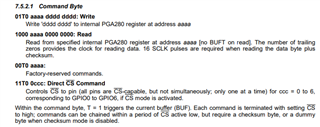Tool/software:
Subject: SPI Communication Failure Between ESP32 DevkitC V4 and PGA280AIPWR - Need Troubleshooting Help
Hardware Setup:
- Microcontroller: ESP32 DevkitC V4
- Analog IC: TI PGA280AIPWR (TSSOP-24 package)
- Connection Method: SPI (VSPI on ESP32)
- Power Supply:
- ESP32: USB powered (3.3V logic)
- PGA280: DVDD connected to ESP32's 3.3V
- VSP: External power supply (+12V)
- VSN: External power supply (-12V)
- VSOP/VSON: 3.3V and GND respectively
Wiring Configuration:
- PGA280 SDI (Pin 15) → ESP32 GPIO 23 (MOSI)
- PGA280 SDO (Pin 14) → ESP32 GPIO 19 (MISO)
- PGA280 SCLK (Pin 16) → ESP32 GPIO 18 (SCK)
- PGA280 CS (Pin 17) → ESP32 GPIO 5 (CS)
- PGA280 DVDD (Pin 13) → ESP32 3.3V
- PGA280 DGND (Pin 12) → ESP32 GND
- PGA280 VSP (Pin 6) → External +12V supply
- PGA280 VSN (Pin 11) → External -12V supply
- Added 0.1μF decoupling capacitor between DVDD and DGND
- Added 10kΩ pull-up resistor on CS line
Software Configuration:
- PlatformIO with ESP-IDF framework
- ESP-IDF version: 5.1.2
- Development Environment: VSCode with PlatformIO extension
- SPI configuration:
- Mode 0 (CPOL=0, CPHA=0)
- Clock frequency: Tried multiple (1MHz, 2MHz, 5MHz, 10MHz)
- MSB first
- Hardware SPI using the ESP32's VSPI interface (SPI2_HOST)
Problem Description:
I'm unable to establish SPI communication between the ESP32 and the PGA280. I've tried three different PGA280 ICs with the same result, so I don't believe it's a hardware failure of the IC itself. When attempting to read from or write to the PGA280 registers, I either get no response (all zeros) or seemingly random data that doesn't match expected register values.
Troubleshooting Steps Already Taken:
- Verified all connections with a multimeter (continuity and voltage levels)
- Tried different SPI clock frequencies (1MHz, 2MHz, 5MHz, 10MHz)
- Verified power supply voltages at the PGA280 pins (including +12V at VSP and -12V at VSN)
- Added decoupling capacitors and pull-up/pull-down resistors
- Tried both VSPI (SPI2_HOST) and HSPI (SPI3_HOST) interfaces on the ESP32
- Tried different SPI modes (0, 1, 2, 3) with no success
- Tried three different PGA280 ICs with the same results
- Tried a different ESP32 board with the same configuration and experienced the same issues
Code Snippet:
#include <stdio.h>
#include "freertos/FreeRTOS.h"
#include "freertos/task.h"
#include "driver/spi_master.h"
#include "driver/gpio.h"
#include "esp_log.h"
#define TAG "PGA280"
// PGA280 SPI commands
#define PGA280_READ_CMD 0x01
#define PGA280_WRITE_CMD 0x00
#define PGA280_REG_ID 0x02 // ID register
// SPI pins
#define PIN_NUM_MISO 19
#define PIN_NUM_MOSI 23
#define PIN_NUM_CLK 18
#define PIN_NUM_CS 5
static spi_device_handle_t spi;
void app_main(void)
{
esp_err_t ret;
// Configure SPI bus
spi_bus_config_t buscfg = {
.miso_io_num = PIN_NUM_MISO,
.mosi_io_num = PIN_NUM_MOSI,
.sclk_io_num = PIN_NUM_CLK,
.quadwp_io_num = -1,
.quadhd_io_num = -1,
.max_transfer_sz = 32,
};
// Configure SPI device
spi_device_interface_config_t devcfg = {
.clock_speed_hz = 1000000, // 1 MHz
.mode = 0, // SPI mode 0
.spics_io_num = PIN_NUM_CS,
.queue_size = 1,
.flags = 0,
.pre_cb = NULL,
.post_cb = NULL,
};
// Initialize SPI bus
ret = spi_bus_initialize(SPI2_HOST, &buscfg, SPI_DMA_CH_AUTO);
ESP_LOGI(TAG, "SPI bus initialize: %s", esp_err_to_name(ret));
// Add device to SPI bus
ret = spi_bus_add_device(SPI2_HOST, &devcfg, &spi);
ESP_LOGI(TAG, "SPI bus add device: %s", esp_err_to_name(ret));
// Try to read ID register
uint8_t id = read_register(PGA280_REG_ID);
ESP_LOGI(TAG, "PGA280 ID: 0x%02X", id);
while (1) {
vTaskDelay(1000 / portTICK_PERIOD_MS);
}
}
uint8_t read_register(uint8_t reg)
{
esp_err_t ret;
uint8_t tx_data[3] = {PGA280_READ_CMD, reg, 0x00};
uint8_t rx_data[3] = {0};
spi_transaction_t t = {
.length = 8 * 3, // 3 bytes (command, register, data)
.tx_buffer = tx_data,
.rx_buffer = rx_data,
};
ret = spi_device_transmit(spi, &t);
if (ret != ESP_OK) {
ESP_LOGE(TAG, "SPI transmit failed: %s", esp_err_to_name(ret));
return 0;
}
return rx_data[2]; // Return the data byte
}
Oscilloscope Observations:
Critical Issue: When connecting an oscilloscope to the SPI lines (MOSI, MISO, SCLK, CS), I'm not detecting any signals at all. This suggests that either:
- The SPI interface is not being properly initialized
- The GPIO pins are not being configured correctly
- There might be a fundamental compatibility issue between ESP32 and PGA280
- The SPI transactions are not being triggered as expected in the code
ESP-IDF Configuration:
- Using default SPI driver configuration
- DMA enabled for SPI transfers
- No custom menuconfig settings for SPI
Specific Questions:
- Why might the ESP32 not be generating any SPI signals on the configured pins, even when testing with different ESP32 boards?
- Are there any known issues with ESP-IDF's SPI implementation that could prevent signals from appearing?
- Could there be a configuration issue in the ESP-IDF SPI driver that's preventing the signals from being generated?
- Are there any known compatibility issues between ESP32 and PGA280?
- Is there a specific initialization sequence required for the PGA280 that I might be missing?
- Could the ESP32's 3.3V logic levels be insufficient for reliable communication with the PGA280?
- Are there any specific timing requirements for the PGA280 that the ESP32 might not be meeting?
- Would a different development board (like an MSP430 LaunchPad) be more compatible with the PGA280?
- Are there any ESP-IDF specific settings or configurations that might affect SPI communication with precision analog ICs?
- Could the DMA transfers be causing timing issues with the PGA280?
- Given that I've tried multiple ESP32 boards with the same result, is there a fundamental architectural limitation or incompatibility I should be aware of?
- Does the PGA280 require specific power sequencing between the digital supply (DVDD) and the analog supplies (VSP/VSN) that might affect SPI communication?
Any help or suggestions would be greatly appreciated. I've spent weeks trying to get this working and I'm at my wit's end.
Thank you!


